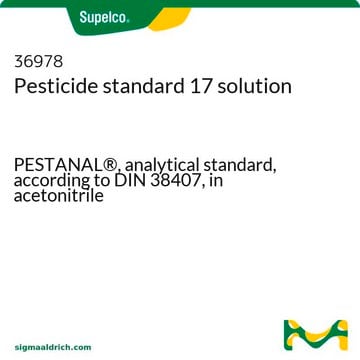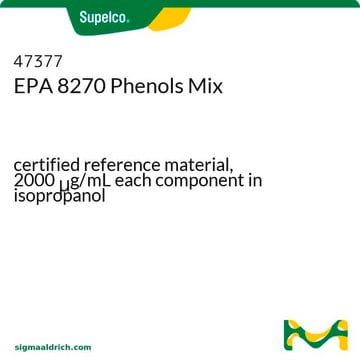45453
Dinoseb
PESTANAL®, analytical standard
Synonym(s):
2-sec-Butyl-4,6-dinitrophenol
About This Item
Recommended Products
grade
analytical standard
Quality Level
product line
PESTANAL®
shelf life
limited shelf life, expiry date on the label
technique(s)
HPLC: suitable
gas chromatography (GC): suitable
application(s)
agriculture
cleaning products
cosmetics
environmental
food and beverages
personal care
format
neat
storage temp.
2-8°C
SMILES string
CCC(C)c1cc(cc(c1O)[N+]([O-])=O)[N+]([O-])=O
InChI
1S/C10H12N2O5/c1-3-6(2)8-4-7(11(14)15)5-9(10(8)13)12(16)17/h4-6,13H,3H2,1-2H3
InChI key
OWZPCEFYPSAJFR-UHFFFAOYSA-N
Looking for similar products? Visit Product Comparison Guide
Application
Caution
Legal Information
Not finding the right product?
Try our Product Selector Tool.
Signal Word
Danger
Hazard Statements
Precautionary Statements
Hazard Classifications
Acute Tox. 2 Oral - Acute Tox. 3 Dermal - Aquatic Acute 1 - Aquatic Chronic 1 - Eye Dam. 1 - Repr. 1B - Skin Irrit. 2 - Skin Sens. 1
Supplementary Hazards
Storage Class Code
6.1A - Combustible acute toxic Cat. 1 and 2 / very toxic hazardous materials
WGK
WGK 3
Flash Point(F)
306.9 °F - closed cup
Flash Point(C)
152.7 °C - closed cup
Personal Protective Equipment
Choose from one of the most recent versions:
Certificates of Analysis (COA)
Don't see the Right Version?
If you require a particular version, you can look up a specific certificate by the Lot or Batch number.
Already Own This Product?
Find documentation for the products that you have recently purchased in the Document Library.
Our team of scientists has experience in all areas of research including Life Science, Material Science, Chemical Synthesis, Chromatography, Analytical and many others.
Contact Technical Service











